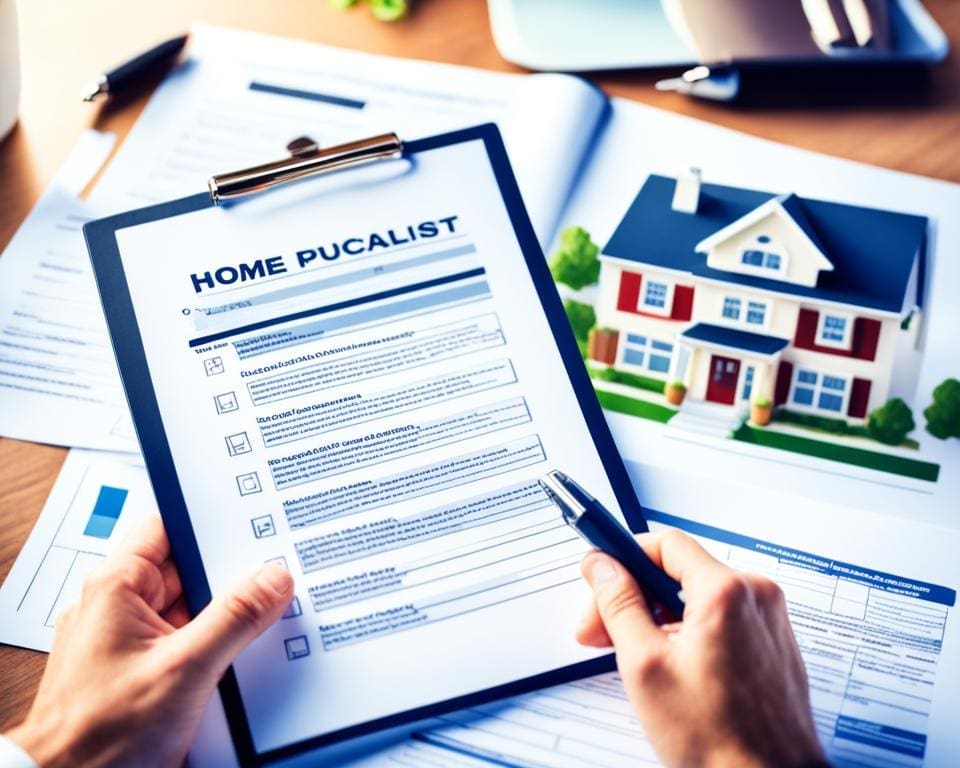Starting the journey to owning a home is thrilling but complex. A Home Purchase Checklist is crucial. It guides you through many decisions to make a huge investment. With careful planning, a successful outcome is more likely.
For first-time buyers, knowing what’s important is key. This checklist helps. It offers tips and raises questions to ask when viewing properties. This ensures you’re aware of everything, from ownership details to the state of fixtures, before making an offer.
At the heart of your journey, understanding legal aspects and gathering documents is vital. Let this guide help you take proper steps towards owning your dream home.
Preparing for Your Home Purchase Journey
Starting your home buying journey needs careful preparation. It’s key to grasp property buying tips for a smooth process. First, know what you want in a home, your budget, and where you want to live. Looking into your local property market will show you trends and prices. Getting a mortgage pre-approval is also smart, so you can confidently search for your new home.
Understanding Property Buying Tips
Viewing properties with a strategy is vital to find the right home. Make a list of must-haves and nice-to-haves to check during visits. Knowing the average price for homes in your area will help set your expectations. Get your financial documents ready, like tax returns and bank statements, to ease the mortgage process. This step is especially critical for first-time buyers who might need down payments between 3% and 20% of the home’s price.
Key Questions to Ask During Property Viewings
Asking the right questions during viewings is crucial. Find out how long the home has been for sale and why the seller is moving. Discovering about neighbours and any previous maintenance issues helps predict future problems. Also, check on the boiler’s condition and what comes with the house. Knowing about nearby facilities will help ensure the area fits your lifestyle, so you don’t just find a house, but the right place for your life.

Home Purchase Checklist: What You Need to Know
When buying a home, making an informed choice is key. A systematic approach makes sure you don’t overlook anything important. It’s critical to check both the property and the area, including local amenities.
The Importance of a House Viewing Checklist
A house viewing checklist is crucial for buyers. It should cover various important factors, such as:
- Looking for damp or subsidence inside
- Ensuring water and electricity work well
- Checking the windows and doors quality
- Seeing if the garden gets enough sunlight
- Noting the placement and number of power sockets
This checklist helps streamline the viewing. For example, knowing the energy efficiency rating is very useful. It’s also vital to check the heating system, whether it’s electric or gas.
Evaluating Neighbourhood and Local Amenities
Checking out the neighbourhood and nearby facilities is also key. The local area can greatly affect both the property’s value and your happiness.
- Explore schools, shops, and parks to gauge distance
- Look at public transport options
- Notice traffic and noise at different times
- Research any future area developments
Features like internet and phone coverage matter for those needing connectivity. Talking to neighbors can offer insights into community life. Thoroughly evaluating areas ensures smarter property decisions.
Conducting Inspections and Surveys
Inspections and surveys are key when buying a home. They help you decide whether to buy a property by unveiling potential issues. This step saves buyers from future financial surprises. It’s also important to choose the right survey for a full property check.
Essential Home Inspection Checklist
Different surveys are available for inspections. Basic valuation surveys are for lenders, focusing on property value for mortgage approval. Homebuyer reports, on the other hand, reveal visible major faults. These are ideal for buyers wanting more details before committing.
For bigger or older homes, full building surveys are best. They are pricier but provide in-depth analysis of possible issues, like structural problems. Matching the survey type to the property’s needs is essential. Smaller surveys cost less but cover less, while full surveys give a detailed look.
Hiring a professional for surveys adds extra assurance. They highlight issues such as water drainage, plumbing, and structural integrity. Reports often use a traffic light system to show necessary repairs. This helps buyers understand maintenance costs.
Understanding Mortgage Requirements
Knowing mortgage requirements is crucial in buying a home. Buyers need to understand different mortgages and lender conditions. They must provide documents like ID, income proof, and financial history. Knowing about deposits and mortgage costs helps in preparation.
Looking into government help for first-time buyers can ease financial strain. Schemes like Help to Buy support people in becoming homeowners. Understanding these aids aligns with buying tips for a smoother market entry.
Final Stages Before Completion
When you’re close to finishing the purchase of your home, checking every detail is key. You’ll need to finalise your mortgage, find a solicitor for legal checks, and get surveys done. A checklist for buying a home is super helpful, ensuring you don’t miss anything. Contracts are usually exchanged 10-14 days before completion, so being quick is crucial to avoid delays.
Moving house is exciting but can be a bit too much at times. Using tips for moving can make things smoother. Getting quotes for removal services early and planning your move reduces stress. If you’re in a buying chain, when you get your keys can change. It might be at 9 am for the first buyer, with others getting theirs throughout the day. Knowing this helps in planning your move better.
The day you complete your home purchase is a big deal. It’s when you officially own the home and get your keys. This usually happens from 10 am to 4 pm, but check with your solicitor for the exact time. Be ready for any last-minute issues, like delays with money or problems in the chain. A good checklist and being careful can help make your big day go smoothly.








